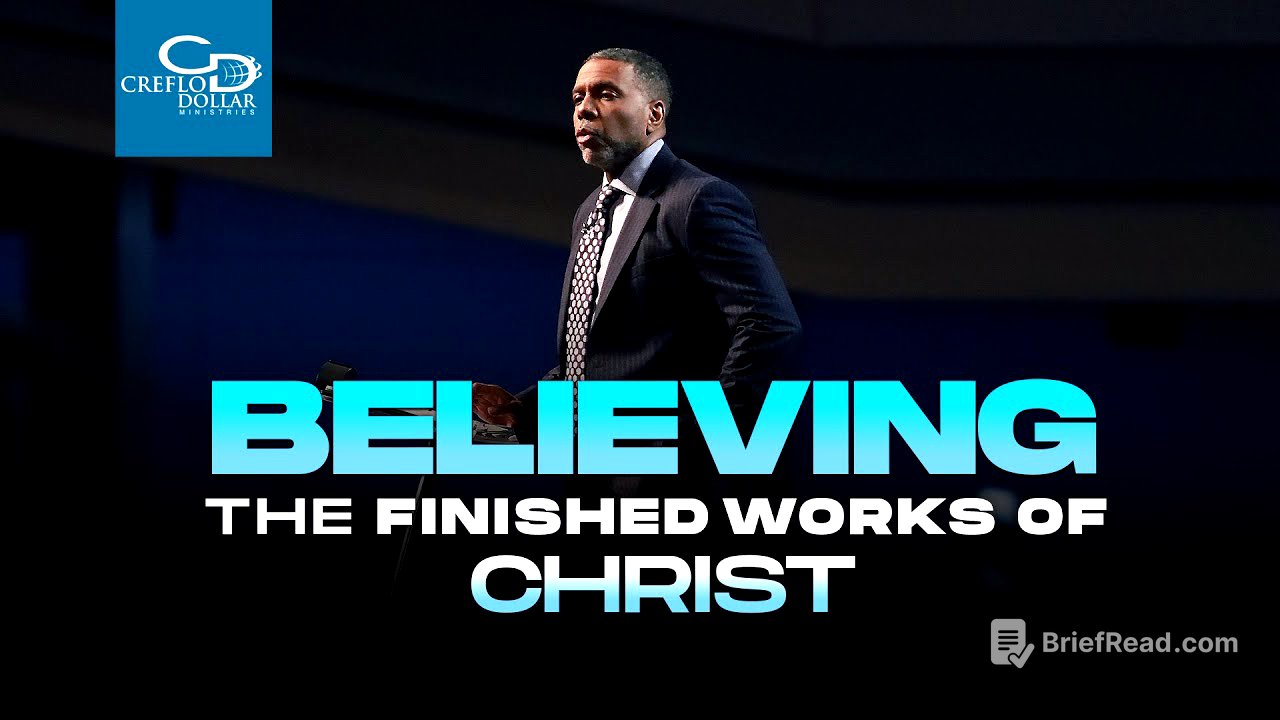TLDR;
In this sermon, Creflo Dollar discusses the importance of believing in the finished works of Christ, particularly His death on the cross. He explains that believers often fail to fully grasp and embrace what was accomplished through Christ's sacrifice. The sermon breaks down the finished work of Christ into three key concepts: propitiation (satisfying God's wrath), redemption (freedom from enslavement to sin), and reconciliation.
- Believing in the finished works of Christ is essential for experiencing the full benefits of salvation.
- Jesus's death on the cross was a complete payment for sins, past, present, and future.
- Understanding propitiation, redemption, and reconciliation helps believers grasp the depth of Christ's sacrifice.
Introduction [0:07]
The program is brought by the partners and friends of Creflo Dollar Ministries. The sermon focuses on believing that sins are forgiven through the blood of Jesus and the grace of God, which are more powerful than any sin. It encourages listeners to have faith in God, regardless of their circumstances, and to recognize the availability of God's grace.
Believing the Finished Works of Christ [2:22]
The sermon begins by addressing why believers don't experience the full benefits of their faith, suggesting it's due to a lack of belief. The core message emphasizes that God asks us to believe in the finished works of Christ, primarily His death on the cross. Many believers don't fully understand what was finished on the cross. The cross represents where Christ endured God's judgment against our sin, acting as a substitute for humanity.
Judgment and Substitution [5:41]
Referencing John 12:31-32, the sermon explains that Jesus took on the judgment of the world, drawing all judgment to Himself when lifted up on the cross. This act was a gift, preventing humanity from being destined for hell. Jesus became our substitute, taking on every sin, sickness, and judgment. He could not have been our savior without first being our substitute through suffering and death on the cross.
Three Words Describing the Finished Work [8:12]
Three words describe the finished works of Christ: propitiation, redemption, and reconciliation. Propitiation deals with God's wrath, which was prevalent in the Old Covenant where God acted as a judge. Propitiation means to satisfy wrath through a sacrifice, a sin offering, compensation, payment, and a peace offering, ultimately a ransom paid to satisfy God's justice. Jesus was the propitiation, paying the ransom so believers would no longer face God's wrath.
Propitiation Explained [10:57]
Before Jesus, the wages of sin was death, as stated in Romans 6:23. God's justice demanded death for sin. However, Jesus's sacrifice provided the gift of eternal life through Him. Referencing James 1:15, the sermon explains that before Jesus, lust conceived sin, and sin brought forth death. Romans 3:25 and 1 John 2:2 are cited to reinforce that Jesus is the propitiation for the sins of the whole world, making anyone who accepts Him a beneficiary of this ransom. 1 John 4:10 emphasizes that God sent His Son to be the propitiation for our sins.
The End of God's Wrath [14:52]
Jesus took humanity's sin upon Himself and suffered God's righteous judgment, satisfying God's anger against sin. Now that the ransom has been paid, God no longer holds wrath against us. Without this, we would die and go to hell. The sin meter was shut down when Jesus became the propitiation, meaning there is no longer a record of our sins.
Redemption: Freedom from Enslavement to Sin [16:46]
Redemption deals with our enslavement to sin. To redeem means to buy out of and remove from, taking sin out of the market. Jesus bought the market out, so sin is no longer available. In the context of salvation, redemption refers to Christ setting us free from the bondage of sin, slavery, and its consequences.
Redemption from the Curse of the Law [18:10]
Galatians 3:13 states that Christ has redeemed us from the curse of the law, which was a curse for not perfectly obeying the law. Jesus delivered us from this curse by becoming a curse for us. He kept every aspect of the law, doing what we could not do. Galatians 4:5 explains that Jesus came to redeem those under the law so that we might receive the adoption of sons, transitioning from servants to sons.
Forgiveness of Sins: Past, Present, and Future [21:07]
Ephesians 1:7 states that we have redemption through Jesus's blood and the forgiveness of sins according to the riches of His grace. God has forgiven our sins—past, present, and future. Even sins committed in the future were in God's past when Jesus died on the cross. The only one remembering our sins is often ourselves. It's important to believe that our sins are forgiven, as the blood of Jesus and the grace of God are more powerful than our sin.
The Importance of Belief [23:30]
1 Peter 1:18-19 emphasizes that it is up to us to believe in this forgiveness. Regardless of how we feel, believing changes our lives. Doubting whether our sins are forgiven creates and nourishes sin consciousness. The sermon promotes a three-message series, "Only Believe," which reveals Jesus as our only solution. Holy living is the objective of grace, but it starts with believing right.
Ministry Support and Invitation to Salvation [26:11]
The ministry expresses gratitude for financial contributions that support their vision of reaching the world with the gospel of grace. The sermon concludes with a prayer of salvation, inviting viewers to receive Jesus into their hearts and declare themselves saved.









